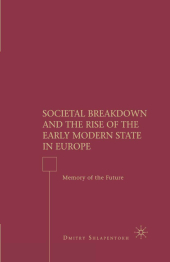 Neuerscheinungen 2015Stand: 2020-02-01 |
Schnellsuche
ISBN/Stichwort/Autor
|
Herderstraße 10
10625 Berlin
Tel.: 030 315 714 16
Fax 030 315 714 14
info@buchspektrum.de |

D. Shlapentokh
Societal Breakdown and the Rise of the Early Modern State in Europe
Memory of the Future
1st ed. 2008. 2015. v, 233 S. 216 mm
Verlag/Jahr: SPRINGER PALGRAVE MACMILLAN; PALGRAVE MACMILLAN US 2015
ISBN: 1-349-37175-0 (1349371750)
Neue ISBN: 978-1-349-37175-4 (9781349371754)
Preis und Lieferzeit: Bitte klicken
Shlapentokh asserts that asocial behavior in both medieval France and the contemporary West is not a marginal occurrence but rather a mainstream phenomena, and one that can often be stopped by strong force as the only antidote to social chaos.
Revolution as Disintegration, Meltdown and the Rise of the Strong State: Major Theorists and Framework of the Work Background to the Early Modern Era Crime in France in the Fourteenth and Fifteenth Centuries Medical Implications: Asocial Process and Disease Persistent Danger: Asocial Behavior in the Sixteenth Century Conclusion: The Rise of the Despotic Government
"Dmitry Shlapentokh´s deliciously Hobbesian tour de force effectively challenges reigning views of the modern state as the product of ideology, discourse, rational choice, contingency, and institutional utility. And by taking crime, banditry, and violence seriously, Shlapentokh persuasively argues that societal disintegration gave rise to the ´strong repressive state,´ which in turn enabled civil society and democracy to emerge. Everyone with a theory of the state should read this book." - Alexander J. Motyl, Professor of Political Science, Rutgers University - Newark
"This book examines the link between social disorder, revolution, totalitarianism, and restoration of ´the basic order.´ Shalpentokh locates his historical causes not in socio-political conflicts, but rather in the associated behaviors that confront order itself. Shlapentokh asks the question: is post-totalitarianism to be our future? This is a provocative thesis and a challenge to the historicity of events, with political implications. This book promises controversy." - Claudio Sergio Nun Ingerflom, Director of Research, Centre National de Recherches Scientifiques, France
Dmitry Shlapentokh is Associate Professor of History, Indiana University South Bend.


